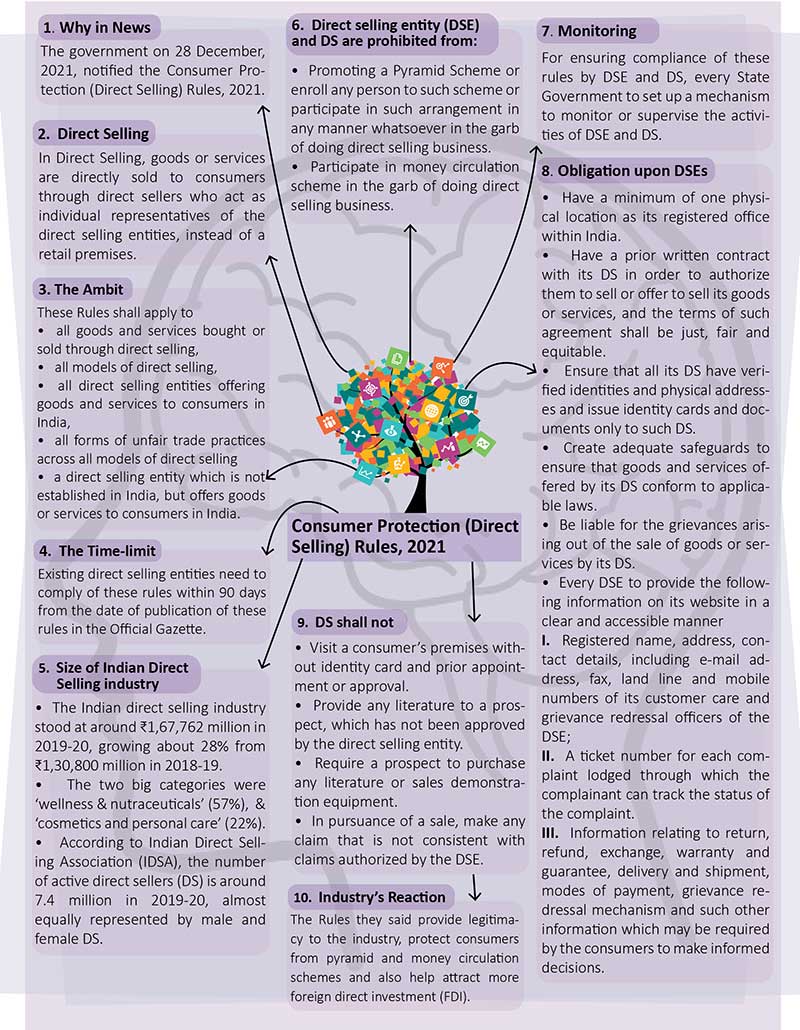Why in News?
- The government on 28 December, 2021, notified the Consumer Protection (Direct Selling) Rules, 2021.
Direct Selling
- In Direct Selling, goods or services are directly sold to consumers through direct sellers who act as individual representatives of the direct selling entities, instead of a retail premises.
The Ambit
These Rules shall apply to
- all goods and services bought or sold through direct selling,
- all models of direct selling,
- all direct selling entities offering goods and services to consumers in India,
- all forms of unfair trade practices across all models of direct selling
- a direct selling entity which is not established in India, but offers goods or services to consumers in India.
The Time-limit
- Existing direct selling entities need to comply of these rules within 90 days from the date of publication of these rules in the Official Gazette.
Size of Indian Direct Selling industry
- The Indian direct selling industry stood at around ₹1,67,762 million in 2019-20, growing about 28% from ₹1,30,800 million in 2018-19.
- The two big categories were ‘wellness & nutraceuticals’ (57%), & ‘cosmetics and personal care’ (22%).
- According to Indian Direct Selling Association (IDSA), the number of active direct sellers (DS) is around 7.4 million in 2019-20, almost equally represented by male and female DS.
Direct selling entity (DSE) and DS are prohibited from:
- Promoting a Pyramid Scheme or enroll any person to such scheme or participate in such arrangement in any manner whatsoever in the garb of doing direct selling business.
- Participate in money circulation scheme in the garb of doing direct selling business.
Monitoring
- For ensuring compliance of these rules by DSE and DS, every State Government to set up a mechanism to monitor or supervise the activities of DSE and DS.
Obligation upon DSEs
- Have a minimum of one physical location as its registered office within India.
- Have a prior written contract with its DS in order to authorize them to sell or offer to sell its goods or services, and the terms of such agreement shall be just, fair and equitable.
- Ensure that all its DS have verified identities and physical addresses and issue identity cards and documents only to such DS.
- Create adequate safeguards to ensure that goods and services offered by its DS conform to applicable laws.
- Be liable for the grievances arising out of the sale of goods or services by its DS.
- Every DSE to provide the following information on its website in a clear and accessible manner
- Registered name, address, contact details, including e-mail address, fax, land line and mobile numbers of its customer care and grievance redressal officers of the DSE;
- A ticket number for each complaint lodged through which the complainant can track the status of the complaint.
- Information relating to return, refund, exchange, warranty and guarantee, delivery and shipment, modes of payment, grievance redressal mechanism and such other information which may be required by the consumers to make informed
decisions.
DS shall not
- Visit a consumer’s premises without identity card and prior appointment or approval.
- Provide any literature to a prospect, which has not been approved by the direct selling entity.
- Require a prospect to purchase any literature or sales demonstration equipment.
- In pursuance of a sale, make any claim that is not consistent with claims authorized by the DSE.
Industry’s Reaction
- The Rules they said provide legitimacy to the industry, protect consumers from pyramid and money circulation schemes and also help attract more foreign direct investment (FDI).









